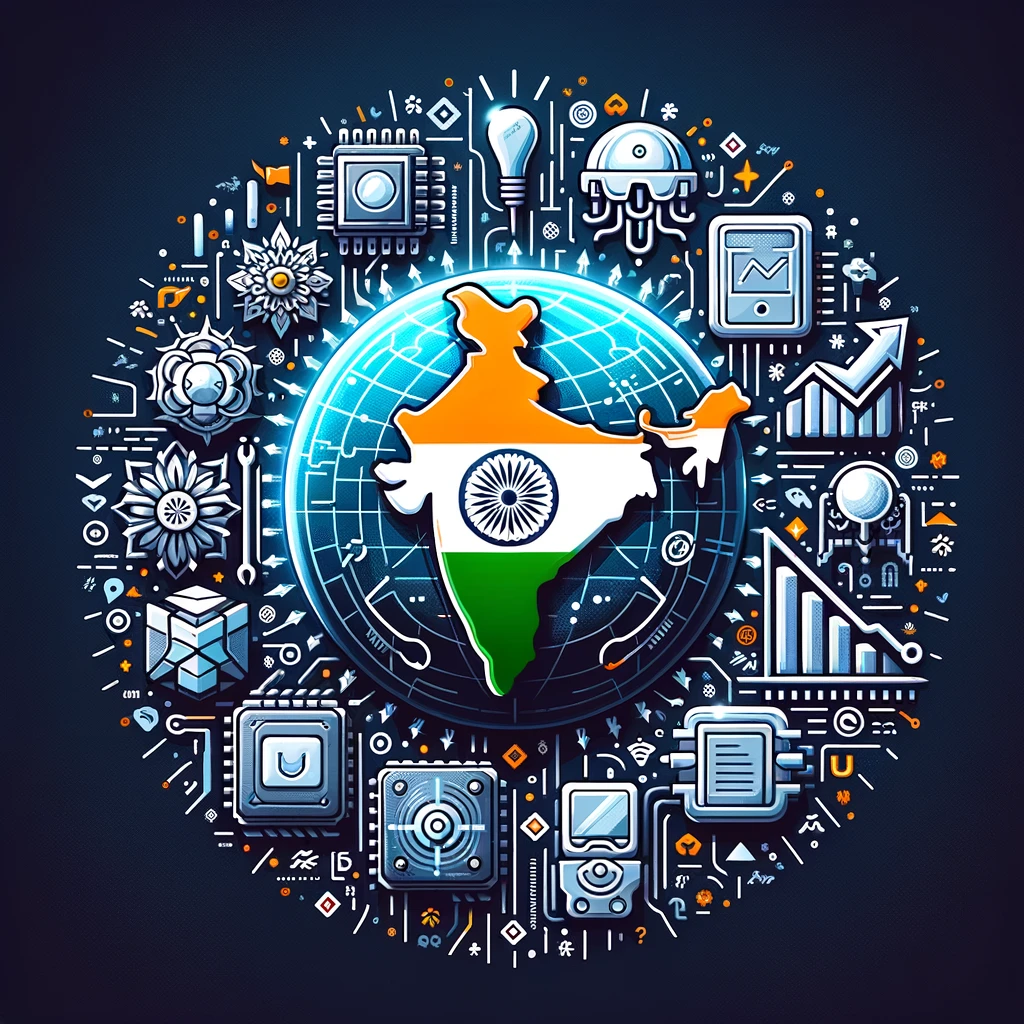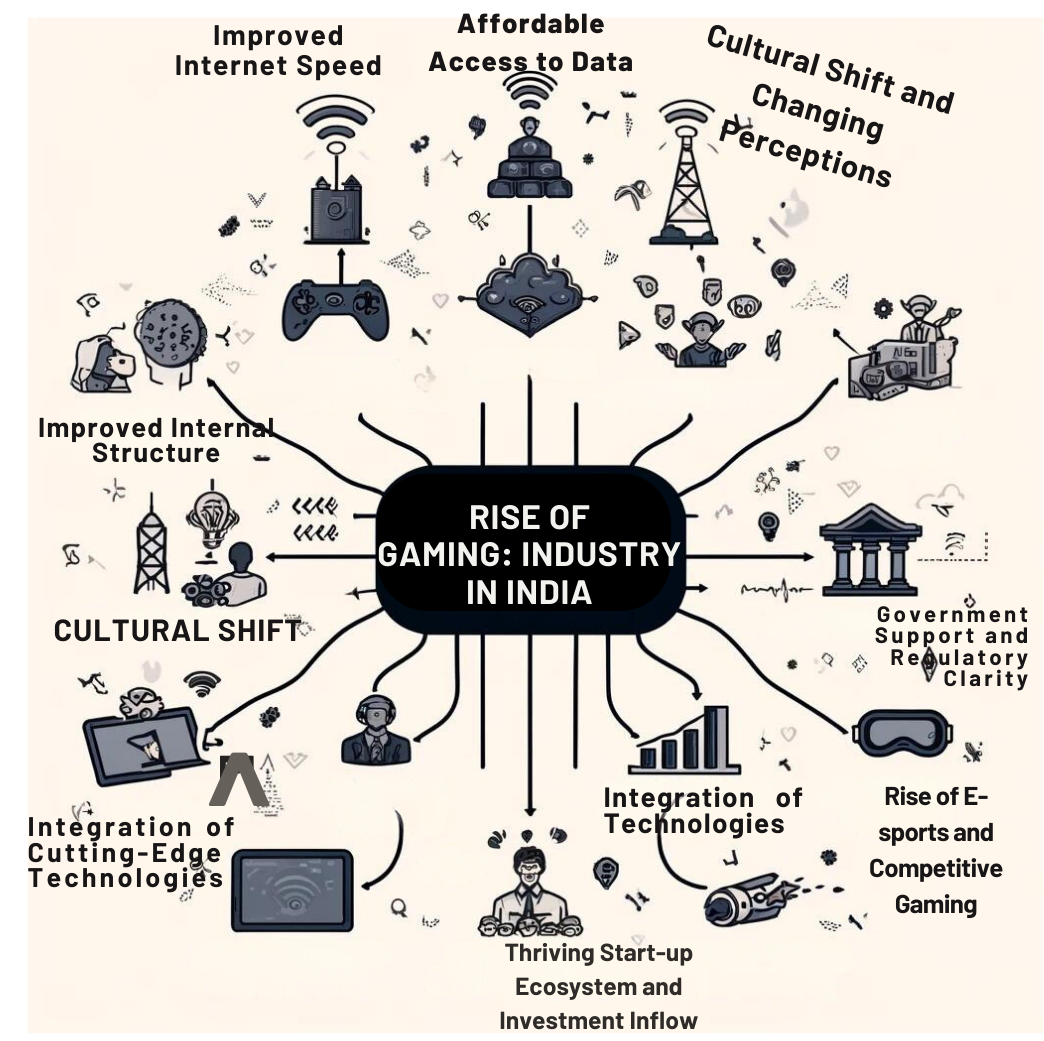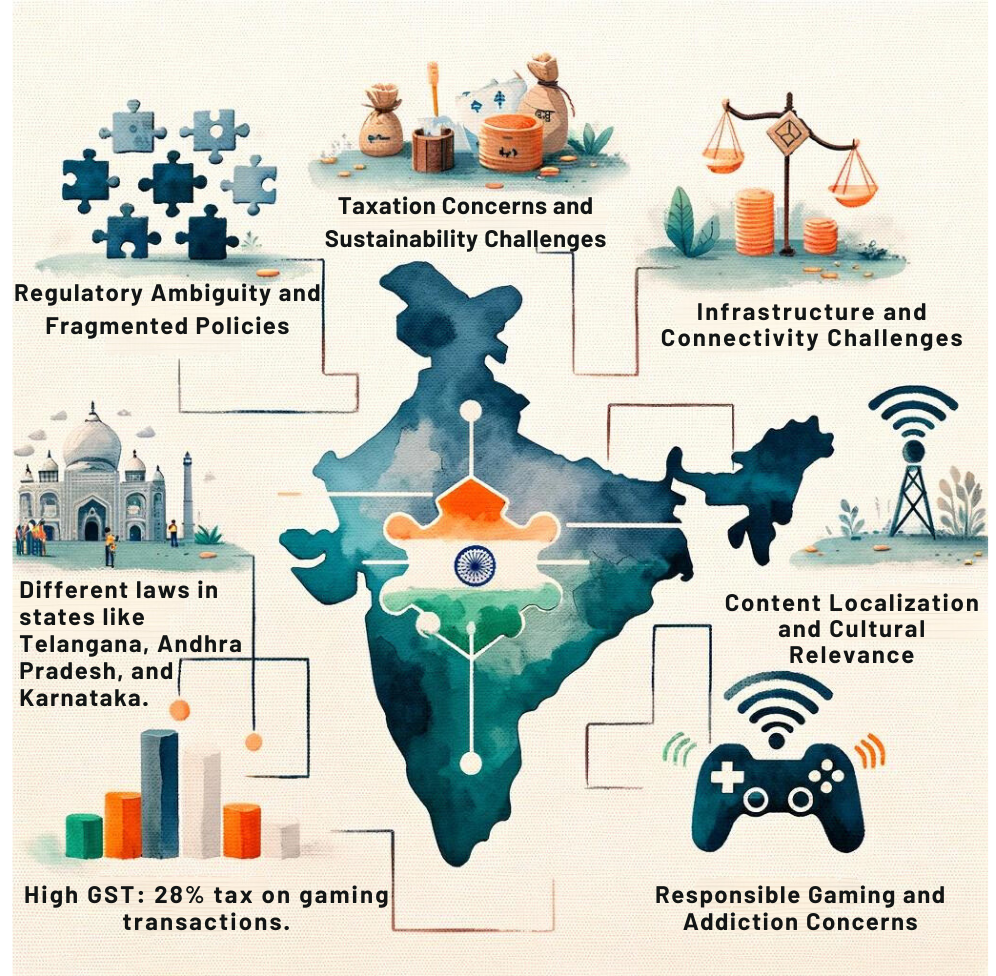India is dynamically growing both in domestic and global gaming markets. The industry develops based on strong annual growth, with continuously growing figures concerning players and downloads, gradually becoming a key building block of the country’s digital economic landscape. However, with great growth comes great challenges: this sudden success can only be maintained after overcoming obstacles along the way. This editorial covers several developing facets of the gaming industry in India: its rise; the technological, cultural, and economic factors that underpin the development of gaming; and discusses the challenges ahead that might hinder this.
| GS Paper | General Studies III |
| Topics for UPSC Prelims | Online gaming, Digital Economy, BharatNet, National Broadband Mission, 5G, IT (Intermediary Guidelines and Digital Media Ethics Code) Rules 2021, Animation, Visual Effects, Gaming, and Comics (AVGC) Promotion Task Force, Esports. |
| Topics for UPSC Mains | Factors Leading to the Rise of the Gaming Industry in India, Major Challenges Related to India’s Gaming Sector. |
Origin of the Article
This editorial is inspired by “Getting to a new level in India’s online gaming sector,” published in The Hindu on 07/05/2024. It discusses the rapid growth and challenges of India’s gaming industry.
Relevancy for UPSC Students
Understanding the dynamics of India’s gaming industry is crucial for UPSC aspirants, particularly for topics under GS Paper II and III which cover Government Policies and Economic Development. Insights into the digital economy, policy frameworks, and technological advancements will enrich their answers and provide contemporary examples for exams. This knowledge is also pivotal in tackling questions about the impact of digital technologies on India’s socio-economic fabric.

Why in News
India’s gaming industry is thriving, a testament to its robust digital infrastructure and youthful demographic. This sector’s emergence as a global powerhouse is significant for UPSC aspirants, given its multifaceted implications on economics, technology, and policy-making. The topic’s relevance is underscored by its alignment with past UPSC questions on digital initiatives and economic sectors, emphasizing the need for comprehensive understanding among future policymakers.
Factors Leading to the Rise of the Gaming Industry in India

Improved Internet Infrastructure and Connectivity
The development of broadband in Tier-II and Tier-III cities, alongside initiatives like BharatNet and the National Broadband Mission, has significantly widened online gaming’s reach. The advent of 4G and the upcoming 5G networks are crucial in enhancing internet speed and reducing latency, making online gaming a smooth experience across India.
Affordable Access to Data and Smartphones
The intense competition among telecom operators has substantially reduced the cost of mobile data plans, making internet access more affordable for a broader audience. This affordability, coupled with a high penetration rate of smartphones, particularly 4G-enabled devices, has democratized online gaming, making it accessible to a wider demographic.
Cultural Shift and Changing Perceptions
The COVID-19 pandemic has shifted the public perception of gaming from just a hobby to a viable career option. Lockdowns led to a surge in online gaming as a form of entertainment, highlighted by a KPMG report noting an increase in average gaming time among Indians, thus fostering a cultural shift in the perception of gaming.
Government Support and Regulatory Clarity
Government initiatives such as the IT Rules 2021 have provided a structured framework for the gaming industry, while the establishment of the AVGC Task Force and the introduction of 100% FDI are steps towards nurturing the sector’s growth. Such support has been instrumental in clarifying regulatory policies and encouraging investment.
Rise of E-sports and Competitive Gaming
The recognition of esports in global competitions like the Commonwealth Games 2022 and Asian Games 2023 has significantly enhanced the sector’s reputation. This inclusion fosters greater interest and investment in the competitive gaming scene, contributing to its growth and international recognition.
Integration of Cutting-Edge Technologies
Technological advancements like AR, VR, cloud gaming, and blockchain are revolutionizing the gaming experience, offering immersive and interactive gameplay. These technologies not only enhance user engagement but also open new avenues for innovation within the gaming industry.
Thriving Start-up Ecosystem and Investment Inflow
The emergence of gaming startups like Game 24X7, Dream11, and Mobile Premier League reflects the sector’s vibrancy and appeal to investors. These startups contribute to a diverse array of gaming options, catering to different preferences and thereby enriching the Indian gaming landscape.
Major Challenges Related to India’s Gaming Sector

Regulatory Ambiguity and Fragmented Policies
The gaming industry in India faces challenges due to the lack of a unified regulatory framework. Varied state laws create a complex environment for operators, as seen with differing regulations across states like Telangana, Andhra Pradesh, and Karnataka, which impacts the sector’s overall cohesion and growth.
Taxation Concerns and Sustainability Challenges
The imposition of a 28% GST on gaming transactions poses significant financial challenges, especially for startups. This high taxation rate could potentially stifle the growth of smaller enterprises and curb innovation within the sector, threatening its long-term sustainability.
Infrastructure and Connectivity Challenges
Despite advancements, rural and remote areas still suffer from inadequate internet connectivity, which impedes the expansion of the gaming industry into these regions. Bridging this digital divide is crucial for the inclusive growth of the gaming sector across all parts of India.
Content Localization and Cultural Relevance
Creating games that resonate with India’s diverse cultural fabric remains a challenge. While some games like Ludo King have successfully captured local flavors, many international games fail to make a similar impact, highlighting the need for more culturally relevant content.
Responsible Gaming and Addiction Concerns
The rise of gaming has brought forth concerns about addiction, particularly among the youth. Addressing these concerns through awareness and regulations is crucial to ensure a balanced and healthy gaming environment.

Measures to Enhance the Gaming Industry in India
Regulatory Clarity
Clear and consistent regulations, alongside the effective implementation of self-regulatory bodies, are essential for fostering a stable environment that supports the growth of India’s gaming industry.
Dedicated Gaming Hubs and Incubators
Establishing gaming hubs and incubators would provide essential support for innovation and talent development within the industry, offering resources and mentorship to nurture upcoming talent and startups.
Promote Game Development based on Indian Culture and Mythology
Encouraging the development of games based on Indian culture and mythology could help create a unique identity for Indian games and appeal to both domestic and international audiences.
Innovative Funding and Investment Models
Exploring new funding avenues such as crowdfunding and venture capital could provide the necessary capital boost to support innovative gaming startups and projects within India.
Women- Trailblazers of India’s Gaming Revolution
Supporting and promoting women in the gaming industry is vital for tapping into a broader talent pool, which can lead to greater innovation and diversity within the sector.
Promote Cross-Industry Collaborations
Encouraging partnerships between the gaming industry and other sectors could enhance the application of gamification and serious games, providing new growth avenues and innovative uses of gaming technology.
Conclusion
The ascent of India’s gaming industry is a testament to technological democratization and cultural adaptation. As we move forward, the challenges highlighted must be addressed through cohesive policies and innovative solutions. For UPSC aspirants, understanding these dynamics offers insights into governance and economic development, critical for both analytical and solutions-based thinking in civil services. Engage deeply, for the gaming industry’s evolution is a mirror to India’s digital and economic trajectory.
| UPSC Civil Services Examination, Previous Year Questions (PYQs) Mains Q. Discuss the advantages and security implications of cloud hosting of servers vis-à-vis in-house machine-based hosting for government businesses. (GS Paper III, 2015) Q. With the advent of 5G technology, how do you foresee the transformation of sectors such as e-commerce, online gaming, and content creation in India? Discuss the implications for employment and economic growth. |


